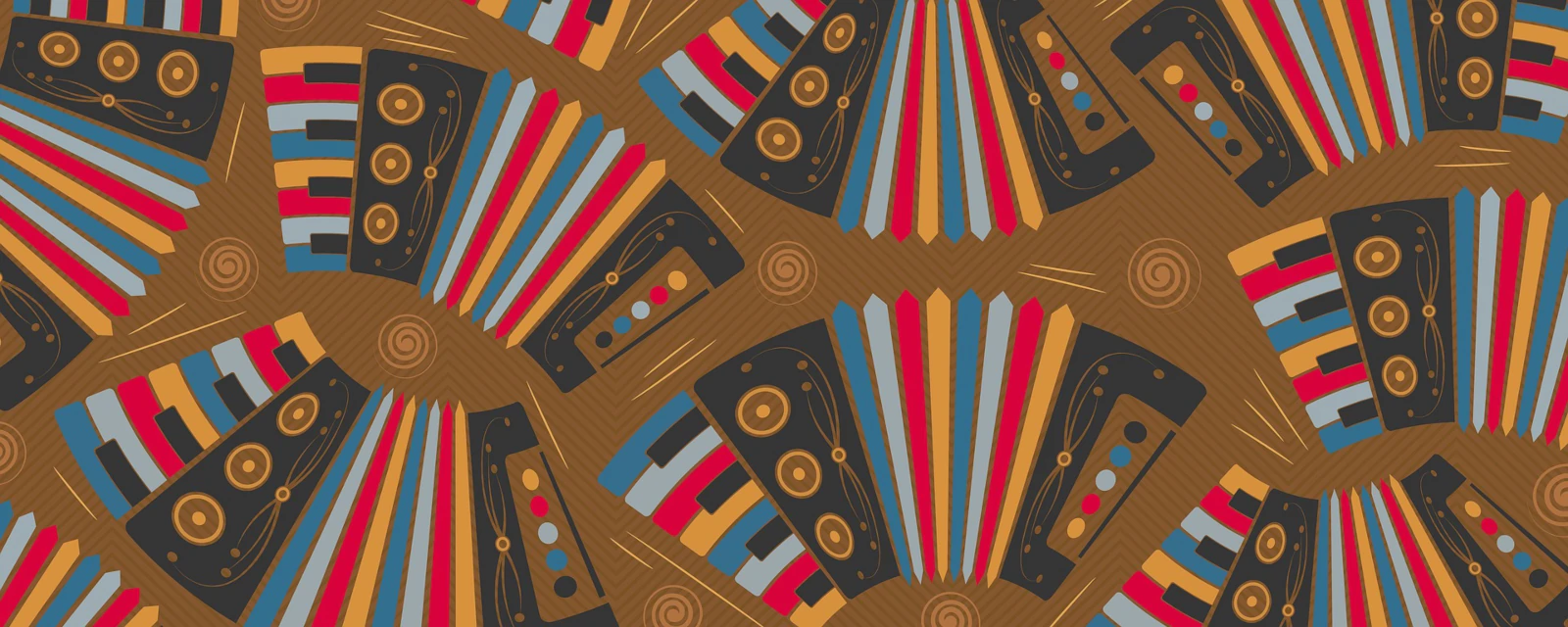
Kitchen Table MFA (ALL): Welcome to Hell
Words By Jesse Lee Kercheval, Art By Speedy McVroom
This essay is part of the Kitchen Table MFA, a series that showcases writing communities through interviews and creative writing.
This essay first published in Ploughshares.
The way my husband tells the story I slipped on the ice, got a concussion, and when I woke up said, “I want to learn to play the accordion.” It is true that, after a concussion, I emailed my friends who were musical, asking if anyone had an accordion I could borrow. I wanted to try one out. I remember this process as being rather more logical than my husband’s story, but I could be wrong. I wanted something portable. Something musical that had buttons or keys like a computer, not something as daunting as the violin, which my daughter plays, where your fingers only know where to be because your ear tells them. My entire lifelong experience with music was a year of half-hearted piano lessons when I was six. I wasn’t sure I had an ear.
A friend replied to my email asking if anyone had an accordion with “You’re kidding, right?” Because it turns out her husband Will has uncounted number of accordions, six in her living room alone, a room I have been in countless times. This is my new realization. Life is full of accordions. I couldn’t see them before, but now, magically, they are everywhere. Will said he would be happy to lend me an accordion.
The first thing Will asked me was what kind of music I wanted to play. I honestly had no idea. I was born in France and had a vague image of the kind of bal musette music, sad, wet, weepy, played in cellar cafes in old French movies. I imagined myself in a beret, with a cigarette dangling from my lip. Okay, he said, for French music you need a G/C. He picked one accordion off the shelf. It was in a case about the size of an old-fashioned record player. He opened it and pulled out a small rectangular instrument, black wood with gold trim. It had buttons, not keys.
On one side were 21 buttons. On the other, 8. It was a Hohner Pokerwork. A good accordion for a beginner, Will assured me. He showed me how to hold the accordion, how to play a C scale. He played by ear. I would learn to pick out tunes, he said. He found his way into a few, apologizing as he did, saying he played mostly Irish music on a B/C accordion and the layout was completely different. I nodded as if I understood. He warmed up and begin playing so fast his fingers blurred, jigs, reels. At the end of a half an hour or so, I thanked him. He put the accordion back in its case, and handed it to me. See how you like it. We shook hands.
I brought the accordion home. I really had no idea how to play it. It turned out I had been right. I had no ear at all. I couldn’t think of a tune, not even “Mary Had a Little Lamb”, and then find the notes. So I Googled “How to play a button accordion” and was rewarded with dozens of sites and thousands of videos. So I set out to learn what I thought of as a decidedly old-world instrument in the new world wide web way.
“Good thing we’re the landlords,” my husband said, joking. He wasn’t the only one.
After I starting noticing accordions everywhere, I noticed accordion jokes are too. The most famous is a cartoon by Gary Larson. People lined up on a cloud are welcomed by an archangel who says, “Welcome to Heaven–Here’s your harp.” Down below, a line is greeted by a devil who says, “Welcome to Hell–Here’s your accordion.” Still I happily spent hours playing, until the odd fact that the same button makes one note when you pull the bellows and another when you push became second nature to me. Like breathing in, then breathing out.
On YouTube I watched Argentines playing tango accordions (as well as bandoneons), Austrians schrammelmusik on schrammelharmonikas, Brazilians forró on their accordions, Chileans cumbia and vallenato, Domincans merengue, Eastern Euroean Jews klezmer music, Egyptians baladi, Greeks rebetiko, Italians tarantellas, Mexicans Norteño and Basques squeezing their trikitixas, The list goes on. Cheap, portable, nearly every country on the globe has taken the accordion as their own. Once I looked, I saw accordions everywhere in indy rock world as well, The Decemberists, Beirut, The Magnetic Fields. I settled on the music of Brittany, ancestral home of the Kerchevals, with its sad Celtic tunes. I practiced and practiced.
And it worked. I got better. When I played the Hohner Pokerwork, first my dog, and then my family, stopped fleeing the house. A statement that is both true and, at least partly, an accordion joke.
Read Nancy Reddy’s interview with ALL here. Also check out the work of other ALL members Steve Tomasko, Marilyn Annucci, and John McCracken.